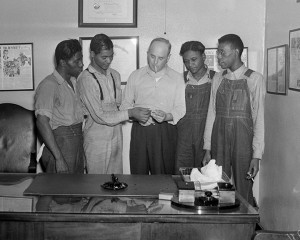

and Jesse Washington
Associated Press Writers
MONTGOMERY, Ala. — Opening a final chapter to one of the most important civil rights episodes in American history, Alabama lawmakers voted Thursday to allow posthumous pardons for the “Scottsboro Boys”: nine black teens who were wrongly convicted of raping two white women more than 80 years ago.
The bill setting up a procedure to pardon the group must be signed by Gov. Robert Bentley to become law. He plans to study the legislation but has said he favors the pardons.
All but the youngest member of the group, whose ages ranged from 13 to 19, were imprisoned on death row after false accusations from the women and convictions by all-white juries. All were eventually freed without executions, although several suffered for many years in prison.
One, Haywood Paterson, escaped. While a fugitive, he helped publish a book about the case. Patterson was captured soon after, but the governor of Michigan refused his extradition to Alabama in 1950.
Over time, the case became a symbol of the tragedies wrought by racial injustice. It inspired popular songs, books and films.
The legal saga also set important legal precedents, including a Supreme Court decision that outlawed the practice of systematically excluding black people from juries.
The last of the men died in 1989.
The House approved the legislation Thursday morning in a 103-0 vote. The measure earlier passed the Senate 29-0.
“This is a great for Alabama. It was long overdue,” said Democratic Rep. Laura Hall of Huntsville, who sponsored the bill in the House.
House Speaker Mike Hubbard, a Republican, said, “You can’t change history, but you can take steps to right the wrongs of the past. The fact that this passed unanimously shows that today’s 21st century Alabama is far removed from the one that caused such pain for so many so long ago.”
The nine teens were accused of raping two white women on a freight train in Alabama in 1931. There had been a fight between whites and blacks on the train, and the two women made the false rape accusations in hopes of avoiding arrest.
The defendants were convicted in trials where, as was typical in such Deep South cases then, guilty verdicts were never in doubt. The Communist Party seized on the case as an opportunity to make inroads among black people and liberals. It got one of its lawyers named as defense counsel, and also secured the services of famed defense attorney Samuel Liebowitz. There were years of appeals — some successful, as one of the women recanted and said their claim was a lie.
Supreme Court rulings related to the case guaranteed the right to effective counsel and barred the practice of keeping blacks off juror rolls.
The Senate sponsor of the legislation, Republican Sen. Arthur Orr of Decatur, credited Sheila Washington, founder of the Scottsboro Boys Museum, for pursuing the legislation after the governor and parole board said they didn’t have the legal authority to issue pardons to the deceased.
Washington said the pardons would shine light on this injustice.
If the bill is signed into law, a petition would need to be filed for each of the men for each of them to be pardoned, said Eddie Cook, executive director of the state parole board. The parole board will then decide whether to grant the pardon. Previously, there had not been a procedure for pardoning someone who is dead.
Orr said it was unfortunate that the pardons are coming after all the Scottsboro Boys have died, but the legislation does let the state write a “better final chapter.”
“Their lives were ruined by the convictions,” he said. “By doing this, it sends a very positive message nationally and internationally that this is a different state than we were many years ago.”





